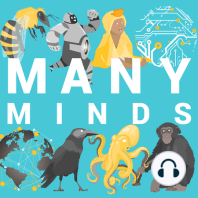81 min listen
Energy, cooperation, and our species' future
FromMany Minds
ratings:
Length:
81 minutes
Released:
Jan 25, 2024
Format:
Podcast episode
Description
Welcome back folks! The new season of Many Minds is quickly ramping up. On today’s episode we’re thrilled to be rejoined by Dr. Michael Muthukrishna. Michael is Associate Professor of Economic Psychology at the London School of Economics. He’s an unusually wide-ranging and rigorous thinker; though still early in his career, Michael has already made key contributions to our understanding of culture, intelligence, evolution, innovation, cooperation and corruption, cross-cultural variation, and a bunch of other areas as well. We wanted to have Michael back on—not just because he was an audience favorite—but because he’s got a new book out. It’s titled A theory of everyone: The new science of who we are, how we get here, and where we’re going. In this conversation, Michael and I talk about the book and lay out that grand theory mentioned in the title. We discuss energy and how—since the very origins of life—it’s proven to be a fundamental, unshakeable constraint. We talk about the nature of human intelligence and consider the dynamics of human cooperation and innovation. We also delve into a few of the implications that Michael’s “theory of everyone” has for the future of our species. Along the way, we touch on carrying capacity, nuclear fusion, inclusive fitness, religion, the number line, multiculturalism, AI, the Flynn effect, and chaos in the brickyard. If you enjoy this one, you may want to go back to listen to our earlier chat as well. But more importantly, you may want to get your hands on Michael’s book. It’s ambitious and inspiring and we were barely able to graze it here. Alright friends, without further ado, on to my second conversation with Dr. Michael Muthukrishna. Enjoy! A transcript of this episode will be available soon. Notes and links 8:30 – Dr. Muthukrishna completed his PhD at the University of British Columbia, where he was advised by Joseph Henrich. He also worked with Ara Norenzayan, Steven Heine, and others. 9:30 – Previous books on dual-inheritance theory and cultural evolution mentioned here include The Secret of Our Success by Joseph Henrich, Not by Genes Alone by Peter Richerson and Robert Boyd, and Darwin’s Unfinished Symphony by Kevin Lala. 16:30 – Dr. Muthukrishna’s paper on the theory problem in psychology, drawn from his dissertation. 17:10 – The classic paper ‘Chaos in the Brickyard,’ about the need for theory-building in science. 22:00 – For a brief overview of Dr. Muthukrishna’s understanding of human intelligence and human uniqueness, see this recent paper. For an overview of cumulative culture in comparative perspective, see here. 23:00 – For the 2005 issue of Science magazine showcasing 25 big unanswered questions, see here. 23:30 – For the review paper on cooperation by Dr. Muthukrishna and Dr. Henrich, see here. 26:00 – For Dr. Muthukrishna’s empirical work that attempts to induce corruption in the lab, see here. 28:00 – The scholar Robert Klitgaard, mention here, is well-known for his research on corruption. 29:00 – See the preprint by Dr. Muthukrishna and colleagues titled ‘The size of the stag determines the level of cooperation.’ 33:30 – A video laying out the RNA world hypothesis. 45:00 – For more on the evolution of human brain size, see our earlier conversation with Dr. Muthukrishna, as well as our conversation with Jeremy DeSilva. 47:00 – For the metric known as Energy Return on Investment (EROI), see here. 54:00 – For more on the cross-cultural variation in numeracy, see here. 55:20 – To correct the record, according to this review of rare numeral systems, there is only a single known base 8 system in the world’s languages. 57:15 – In our earlier conversation (around 42:00), we discussed the work by Luria on ‘If P, then Q’ reasoning. 57:30 – For more on the so-called WEIRD problem, see our earlier audio essay. 1:00:30 – For some experimental evidence consistent with the idea that language improves the transmission of cultural information, see here. 1:07:0
Released:
Jan 25, 2024
Format:
Podcast episode
Titles in the series (100)
From the archive: Clever crows and cheeky keas: A conversation with Alex Taylor by Many Minds
